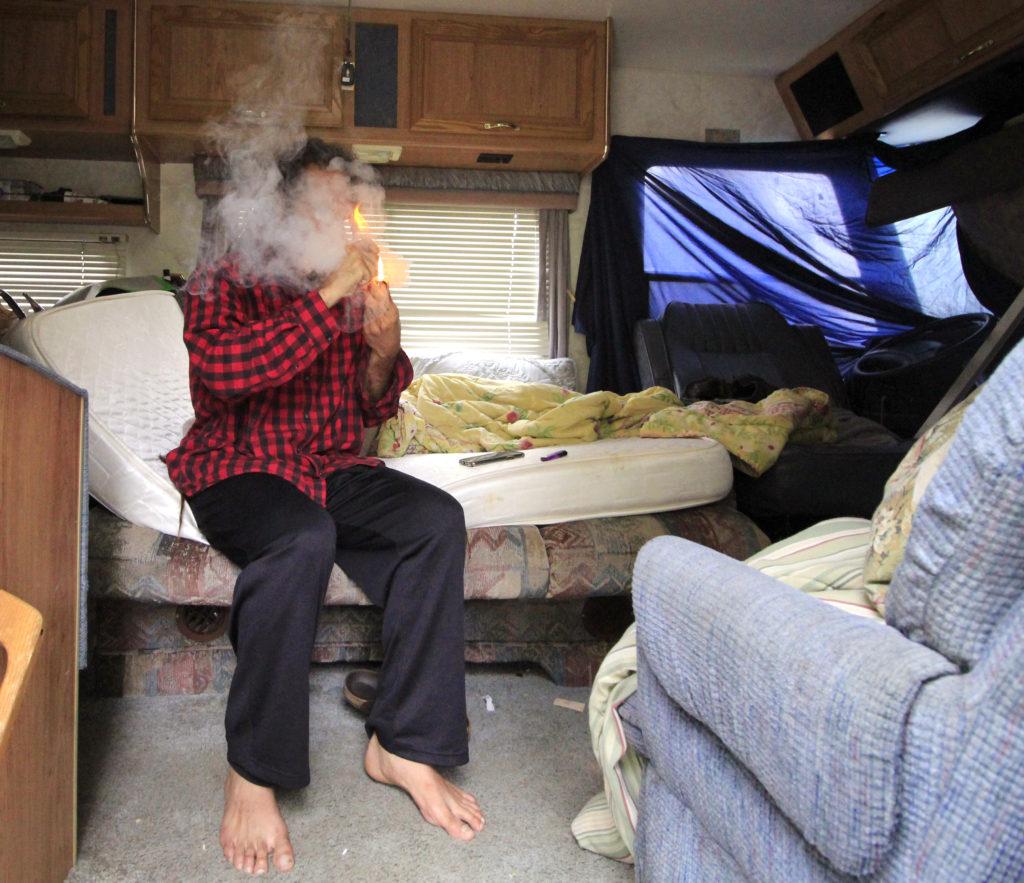The lack of access to affordable housing on and off campus has pushed some San Francisco State University students to live out of their vehicles.
Between 20 to 30 vehicles parked on Lake Merced Boulevard and Winston Drive, adjacent to campus, are motorhomes and vans that people of various ages and professions use as living spaces, storage units or dumpsters.
Among them is Josh Martinez, a 28-year-old cinema major and former marine who has been living out of his van while attending classes at SF State for three semesters.
“Some people living out here are probably homeless,” Martinez said. “But I don’t consider myself homeless. I do this by choice. If I wanted to get an apartment I could afford it, but I like this. I like the money I’m saving.”
He said he likes living in his van because he saves money that would otherwise be spent on a high-priced apartment or shared dorm room.
Martinez said he is only minutes from class, has a place to shower at the Mashouf Center and plenty of places to eat.
He said he chose to attend school in San Francisco to maximize the monthly income he gets through his GI Bill, which depends on the cost of living in his city of residence.
Addae Hill, 34, is a former member of the U.S. Navy who attends SF State and works as an Uber driver.
Hill said he was placed on a waiting list along with 2,000 students to hoping to get a dorm on campus, and although he could afford a one-room apartment for about $900 a month, he’s been rejected by various landlords.
“It’s hella expensive and hella competitive,” Hill said. “There are dudes working in the city making $20,000 a month. And I’m a college student trying to get my mom to co-sign with me.”
Hill said he’s not homeless, but he spent the first two weeks of the semester sleeping on couches and futons in houses with eight to 10 other people, “AIRBNB style,” and paying $100-per night at hotels.
He said he is so discouraged that he too is considering living the “van life”.
“I was actually going to buy a Sprinter [cargo van] and just live out of that,” he said. “I’m thinking about doing it next semester because the cost of living is just ridiculous. So I understand these people who are living out their trailers right now.”
Twenty-two-year old Ben Lightner — not a SF State student — works at an auto shop and has been living out of his van for about three weeks. Lightner said that within a year, he plans to move into an apartment with his his girlfriend, who is a student at SF State.
Just like Hill, Lightner said even though he can afford rent, the challenge for him is getting an application accepted by a landlord.
“It’s just so difficult to find a place anywhere in the city,” he said.
San Francisco residents who turn to vehicles for shelter find it increasingly difficult to park their motorhomes, vans or even cars overnight as communities have pressured police to crack down, according to Jennifer Friedenbach, executive director of the Coalition on Homelessness.
“We are in midst of a housing crisis in the city and folks have no other choice than to sleep on the street or in [motorhomes],” Friedenbach said. “And until we have practical solutions we simply can’t just keep moving them around the city. It is ineffective and inhumane.”
SFPD Officer Ian Richards, a member of the Homeless Outreach Team, is clear that “it’s not a crime to be homeless.” But police also have to navigate regulations and public complaints. Next week, the Xpress talks to more individuals living in their vehicles, and looks at the way law enforcement handles them.












Aaron Goodman • Sep 12, 2018 at 10:26 am
Stop the SFSU-CSU Masterplan, the housing to be built will not be “rent-controlled” what they are demolishing IS rent-controlled housing, the problem at SFSU-CSU is that they purchased rent-controlled housing in the first place and have been able to price up the units consistently. Stonestown and UPN and Parkmerced UPS units.
They should be focused on building on the existing site not the sprawl and accumulation of prior sound rent-controlled housing….
The two housing projects will be priced out of reach of most students…